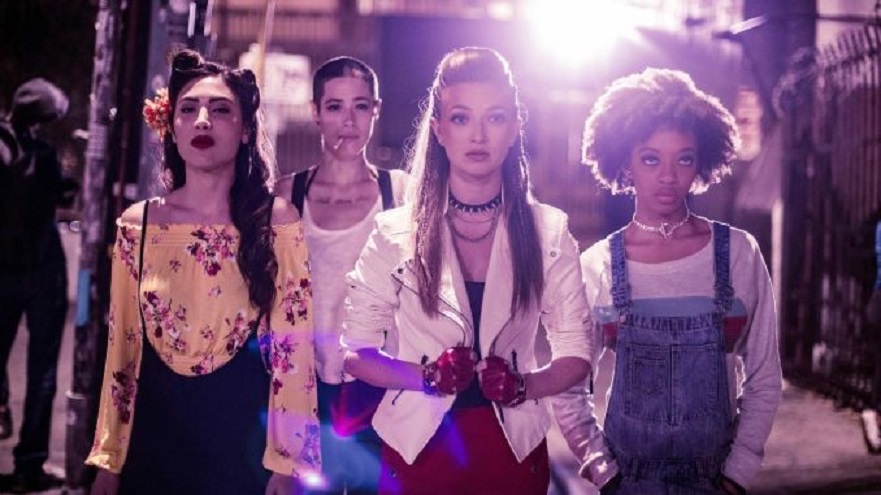‘Bit’ and the Politics of Power [Matriarchy Rising]

Few creatures in horror are as liberated as the female vampire. Existing in opposition to a Judeo-Christian ideology, they are uninhibited by the patriarchal norms that permeate most modern societies. Female vampires can express their sexuality in ways often deemed unacceptable for women in “polite” society. But vampire lore is not without its domineering men. The concept of the Master and his brides is one that sees women subjugated and turned into feral monsters with insatiable appetites. They are not empowered by their sexuality but enslaved by it. Both of these concepts come to a head in Brad Michael Elmore’s 2019 film Bit.
Duke (Diana Hopper) is the leader of a family of female vampires. Determined never to create another Master, she’s forbidden them from ever turning a boy. Her fear of empowering men reads as logical at first glance. But, it opens the door to a conversation about the essence of power itself. Does it corrupt absolutely and are women really more capable of handling it? In short; will matriarchy always be more successful?
Laurel (Nicole Maines) is a recent high school graduate spending the summer in LA with her older brother Mark (James Paxton). On her first night out, she hits it off with a cute girl named Izzy (Zolee Griggs). While enjoying private time at a rooftop afterparty, Izzy suddenly bites Laurel’s neck and begins to drink her blood. Intrigued by the teenager, Duke stops Izzy from killing her and offers Laurel a place in the group. She will be the newest recruit on a team that hunts down shitty men in a bit of murderous multitasking.
Also Read: Virtual Panel Series “Dissecting Horror” Continues with Halloween Day BIT Reunion!
Duke, Izzy, Roya (Friday Chamberlain), and Frog (Char Diaz) are ridding the world of predators and incels while satiating their nightly thirst for blood. In exchange for freedom, power, and eternal youth, Duke has a few rules. They are never to invade the thoughts of another vampire, a technique called glamouring. They must kill or turn what they feed on, and they are never to offer their powers to a boy. Duke insists that vampirism only be bestowed upon women because men are incapable of harnessing it ethically. In her words, “they can’t handle power. They have it already and look what they’ve done with it.” Men have created a world where women are subservient and must become monsters to gain autonomy.
Duke makes a powerful case for vampirism as a feminist awakening. She says,
“The world is a meat grinder especially if you’re a woman. We’re politically socially and mythologically fucked. Our rules are secondary, our bodies suspect, alien, other. We’re made to be monstrous so let’s be monstrous. Let’s be gods.”
Also Read: ‘Ex Machina’: Gods, Machines, and Escaping A Perverse Garden of Eden [Matriarchy Rising]
It’s a fist-pumping moment most women can relate to. Our society was built to enable and support white cishet men. Everyone else falls on varying degrees of a power ladder they will never reach the top of. So many of our myths revolve around teaching women what their social roles should be and to fear those who step outside of them. We’ve been taught since birth to act in a way that doesn’t threaten the men around us. But the only thing that ever leads to is more subservience. If existing as our chosen selves gives us power over the men who fear our liberation, let’s take that power and use it against them. We’ve already been punished as if we have so what do we have to lose? It’s a tempting argument, to say the least.
Duke is offering Laurel the chance to live at the top of the food chain. She will be the predator and men the prey. She will strike fear into the hearts of those who would victimize her if given the chance. But in addition to ignoring the fact of non-binary vampires and victims, Duke’s offer comes with a price. Laurel will have to abandon her code of ethics and occasionally kill an innocent person. Duke estimates that the Troll to Innocent ratio of who they feed on is roughly 80/20. Part of becoming monstrous is actually being a monster and vampires are no different. Their power inherently comes from draining the life out of their chosen victims, guilty or not. As monstrous gods, they hold frightening power.
Also Read: ‘Teeth’ and the Dawn of Adaptive Empowerment [Matriarchy Rising]

After joining the family, Laurel learns that Duke is hiding a big secret. Having been a bride of a powerful Master, Vlad (Greg Hill) for decades, she keeps his heart locked away in a secret box. Duke periodically eats tiny bits of the undead organ to gain his power. When Vlad escapes, we learn that Duke has broken one of her own rules. She’s been subtly controlling the thoughts and actions of her fellow vampires using Vlad’s power to glamor.
Duke subtly guides them to agree with her and do her bidding. There’s no real reason why she needs to. They share similar goals and she likely wouldn’t ask them to do anything they wouldn’t want to do anyway. But her need to control is based on fear. Duke doesn’t feel secure enough in her leadership to resist tipping the scales in her favor. It’s a decision that will come back to bite her.
This desire for power probably stems from decades of servitude. As a queer teen in the 1970s Duke ran away to New York City. She fled the tiny farming community she was born into and found a way to live life on her own terms, without fear of what other people would think. She’s finally found freedom and vows never to give it up again. But Duke loses her autonomy when she meets Vlad. A centuries-old vampire, he glamours Duke and adds her to his cohort of subservient women; his brides. Floating through decades of decadence, Vlad manipulates her thoughts and actions. She loses herself in his dominance. Having become drunk on power, Vlad finally lets his guard and his brides imprison him. Duke traps and feeds off of his heart, freeing herself from his insidious control.
Also Read: The MKE Sisters of ‘Black Christmas’ (2019) Fight Back [Matriarchy Rising]
Though she makes good points about men and power, part of Duke’s aversion to male vampires likely comes from the trauma of being thrust back into a patriarchal world. It’s implied that before running away, she had to hide her true identity and that even sleeping on the streets was preferable to the life of conformity she left behind. In order to survive, she became a sex worker, giving strange men total possession of her body. She’s finally found her footing when Vlad throws her back into a life of subservience.
Given her experiences, it’s no wonder she prefers to kill men rather than live with them. But why does Duke choose to keep Vlad’s heart at all? She could burn it and rid herself of his shadow forever. Yet she keeps his spirit close. Perhaps she wants to relish the feeling of empowerment she gets from knowing she is now the one with ultimate control. Destroying him forever would mean moving on and maybe she’s not done punishing him. More upsetting is the possibility that she simply cannot imagine power that doesn’t come from domination.
Also Read: Heather Donohue and the Power of Insisting [Matriarchy Rising]

Duke’s definition of leadership essentially means ultimate control because that’s what was modeled for her. She sees the way to regain the autonomy she lost as Vlad’s bride by taking on his dominant tendencies and controlling nature. She is restoring an unhealthy balance of power rather than abolishing a subservient system. Though she is arguably kinder than Vlad, Duke still doesn’t trust her family to follow her of their own free will. It’s a misunderstanding common to people who have been abused. She takes on the toxic traits of her abuser because that’s what she understands strength to be. Duke vows never again to be a victim of a controlling Master, but she accomplishes this by becoming one herself. Her unquestioned power has led to corruption.
Overcome by her thirst, Laurel accidentally bites Mark, putting him squarely on Duke’s kill list. Her second rule demands that they kill any boy they bite or feed on. Allowing him to live would mean breaking the cardinal rule and turning him into a vampire. Duke refuses Laurel’s request for mercy, opening up a larger question about men’s ability to hold power.
Also Read: Matriarchy Rising: Laurie Strode Guides a New Generation of Final Girls
While it’s certainly true that men as a collective have abused their authority for centuries, individual men each have the freedom to choose their own actions. A truth uncomfortable for many feminists is that assuming all men seek to control women is just as essentialist as assuming every woman would be inferior to a man. While all cishet men benefit from the misogyny they’re born into, the reality of perpetuating gender-based oppression is more complicated. We don’t know what Mark will do with his newfound power, but simply being male doesn’t necessarily mean he will turn out to be abusive.
Laurel reminds Mark that being a boy doesn’t give him an excuse to be an asshole. She warns him to control his actions and hopes for the best. It’s an interesting reversal to suggest that assuming men will abuse their power removes their incentive to be ethical. To paraphrase Duke’s invitation to vampirism, if all men are seen as monstrous, why wouldn’t they just continue to be monsters? It’s scary to give up control so soon after finding our own empowerment, but we have to risk trusting that some men will be allies. The balance lies in honest accountability and men who are willing to ceed the power automatically given to them for the greater good.
Also Read: Sidney Prescott & Gale Weathers: Sister Survivors and Horror Matriarchs
Having broken the first rule of Bite Club, Duke is thrown into the family’s underground prison cell. The film ends with Laurel taking a bite of Duke’s heart and then offering it to the rest of the family. While it is refreshing to see Laurel willingly share the source of her strength, they are still drawing empowerment from the body of another; the cardinal sin men have been perpetuating for millennia.
We will never reach true equality as long as we keep stepping on each other to climb upwards. Laurel says she envisions a world where everyone is a vampire and we’re forced to work out our differences. She’s describing an even playing field, one where women have just as much power as men. If we can learn to build power from within and protect the inherent power of those around us, maybe we can begin to build systems of leadership that exist outside of gender. By removing the patriarchal structure that automatically tips the scales, maybe we can transcend gender-based oppression and relate to each other as true equals.
Categorized: Editorials Matriarchy Rising News
